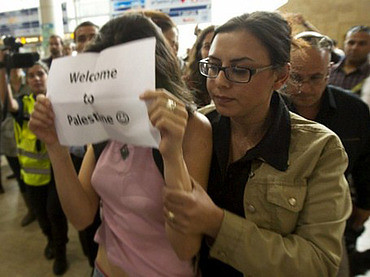
Palestine solidarity activists arrested by Israeli police enroute to protest conditions in the West Bank. Europe prevented many from bording flights to Israel., a photo by Pan-African News Wire File Photos on Flickr.
Israel follows South Africa's model of apartheid against Palestinians: ECFR
Bassem Aly , Saturday 11 May 2013
The EU has to take concrete measures against Israel as its pro-peace political discourse is not enough, a European think tank report recommends
The European Council on Foreign Relations (ECFR) has issued a report tackling the situation of the Palestinian-Israeli conflict, warning that Israel risks the fate of apartheid state South Africa, embodied in international isolation, if it continues to entrench its illegal occupation of Palestinian land.
The ECFR describes itself as a “pan-European” think tank that conducts research and promotes informed debate across Europe, benefiting from the political experience of more its 170+ members, including serving ministers, MPs, EU senior officials, former NATO chiefs and intellectuals.
Among these members are British former Foreign Secretary David Miliband, former German Foreign Minister Joschka Fischer, and former EU High Representative for Foreign and Security Policy Javier Solana.
Titled“Europe and the Vanishing Two-State Option,”the report argues that the ceaseless expansion of illegal Israeli settlements, the lockdown of Gaza, and the systematic undermining of Palestinian presence in East Jerusalem and in the West Bank, have eroded the basis for a Palestinian state “to the point of collapse.”
“Israel’s election has produced a new government with an even more pronounced annexationist bent towards the West Bank, while US President Obama’s visit to the region lived down to the minimal expectations prepared for it,” the report added.
The London-based ECFR called on the European Union (EU) to boost its support for the Palestinian Authority so as to strongly push the two-state solution forward.
“As so often, Europe issues great statements and then under-cuts them by its actual behaviour,” Nick Witney, author of the report and a senior policy fellow at ECFR, said.
“As we have thickened ties with Israel in recent years, at both the EU and national levels, so Israel has learned to regard calls for an end to settlements and for de-occupation as so much huffing and puffing. But unless Israelis wake up soon to how they are ‘losing’ Europe, the outcome will be disastrous for all concerned.”
The report stressed Israel’s need to “change course” in order to tend to the suffering of the Palestinians, as well as serving its own interests in the Arab world.
Witney pointed out that the point of a common EU position ought to be to exercise a collective weight.
What could Europe do?
Polling and recent UN votes show that Israel is "losing" Europe, the report claims.
Such argument proved correct after the UN General Assembly vote on 29 November to recognise Palestine as a non-member state, as Israel responded by announcing plans to build almost 3,000 homes in the West Bank and East Jerusalem.
At that time, UN ambassadors from several EU state such as Britain, France, Germany and Portugal highlighted European fears over the peace stalemate and stressed that their governments "strongly oppose" Israeli settlement construction plans.
However, the report underlines that the European message is “muffled” because Europeans undercut their own calls for ending settlement construction by continuing their commercial, defence and scientific ties with Israel.
Despite this, the one billion Euros annual aid from Europe to the Palestinians has produced a “dependency economy,” with the real economy progressively “hollowed out.”
Other means of financial backing for the Palestinians are suggested, such as diverting money to economic development projects.
Thus, the ECFR suggests stopping the extension of benefits (market access, EU grants, etc) to settlement-based individuals and enterprises as though they were resident of Israel.
Also, the EU should take no further steps to associate Israel and its economy more closely with the EU without parallel moves by Israel to relax the occupation.
“Governments could usefully issue official advice against such economic activity or end the situation whereby settlers travelling on an Israeli passport benefit from the EU’s visa-waiver arrangement with Israel," the report mentioned.
“If the visa requirement were reinstated for all such settlers, it would both make sense in the context of consistency and make it easier to consider refusing admission to Europe those behind the upsurge in settler violence, as recommended by the EU Heads of Mission.”
These measures should coincide with supporting the agriculture and industrial sectors run by Palestinians, currently thwarted by Israeli authorities, so as to enable the private sector to generate jobs and tax revenue.
“For European donors, the strategy should be to put the PA on notice that the days of the dependency state are numbered, but that Europe will stay around long enough to assist them in shifting their focus from state-building to economy-building,” the report concludes.
“European readiness to back Israel right or wrong is diminishing, and Israel needs to take with deadly seriousness the prospect that, with current trends, it could one day find itself exclusively reliant on the US for diplomatic support in the face of a hostile global campaign," the report states.
http://english.ahram.org.eg/News/71161.aspx
No comments:
Post a Comment